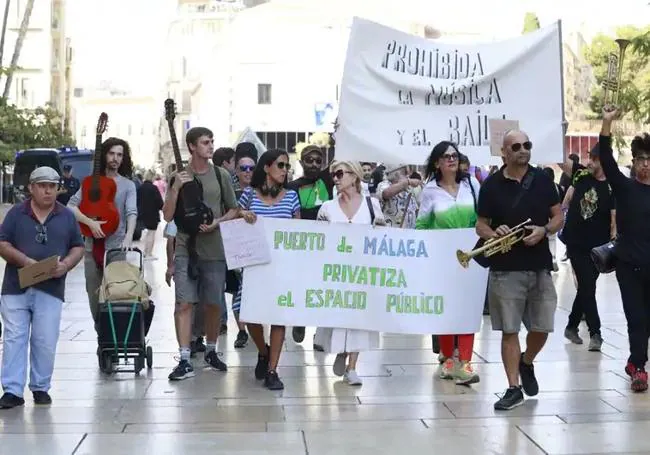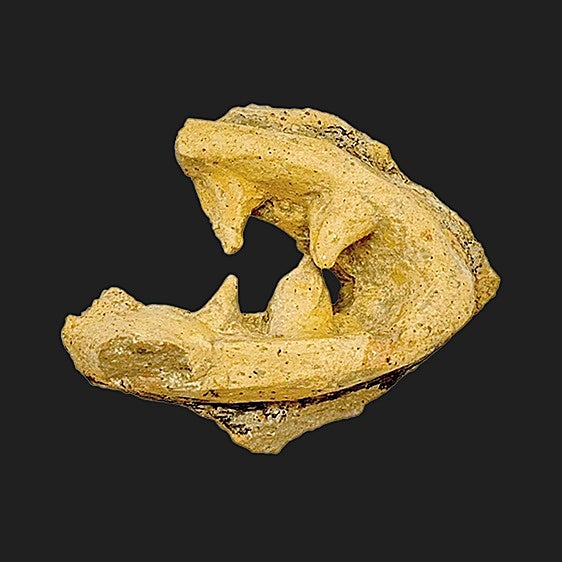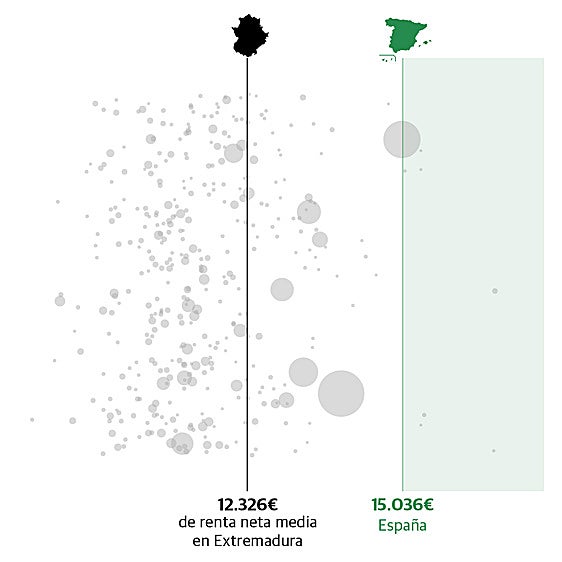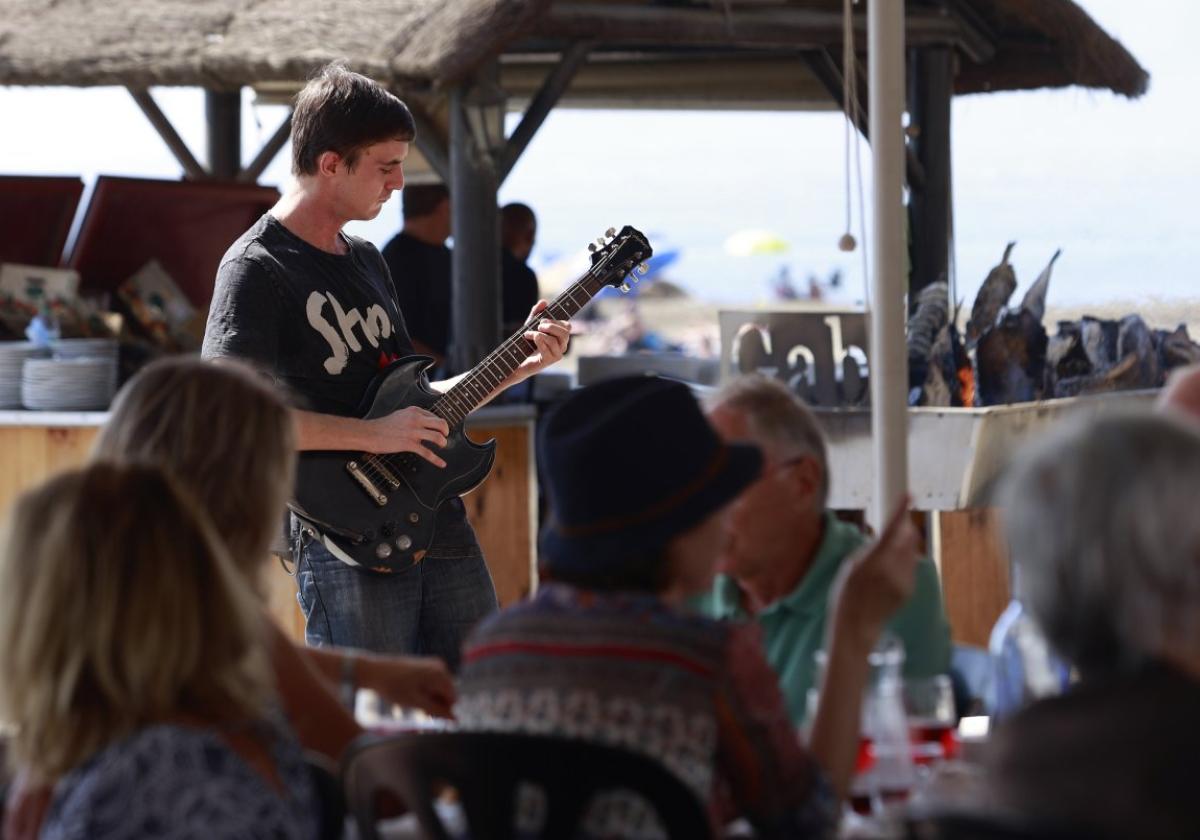In search of a spot on the street to entertain the public
Malaga city council is bringing in new regulations for busking; rules are already in place at the port similar to the long-standing set-up in tourist hotspots on the Costa del Sol
Regina Sotorrío
Friday, 27 October 2023, 15:14
Álvaro Bermúdez works a double shift - lunch and dinner. Mondays and Tuesdays, with some exceptions, are his days off. His sounds like a job in the hospitality industry, yet he is neither waiter nor cook. He is a musician. "And I work the terraces," he says.
Ever since Malaga's municipal authority put an end to the authorised busking spots in the city centre shortly before the pandemic, musicians have been looking elsewhere to earn a living. Álvaro headed east towards the restaurants on Pedregalejo promenade, "in places where police don't patrol". There he runs through his playlist of rock classics, from Dire Straits to Santana, with his electric guitar and a small amplifier. "But always looking over my shoulder, half scared," he says. Things are about to change.
After three years of deadlock, Malaga city council and local street musicians are looking for an agreeable solution between artists, locals and police that permits busking without disturbing residents.
Port rules
Meanwhile busking is already being regulated at Malaga's port. The port authority recently published rules to authorise street performances, similar to those operating effectively for years in Torremolinos, Nerja, Ronda, Marbella and Fuengirola.
These towns with a high influx of visitors have long appreciated the potential of live music to boost business, creating a special vibe for tourists. But always with two basic conditions: not causing a disturbance and offering quality. Other than that, each town organises it in its own way.
The reality for the provincial capital is more complex due to the size of the city itself and the high level of noise affecting much of the city centre.
After a failed attempt at organisation that broke down definitively in 2019, a fresh approach was made last April. Representatives from the environment and culture departments met with the president of Lafama (a federation that includes an association for street performers), Pedro López Reyes, and several buskers.
The meeting was positive and they agreed some initial rules: busking hours to be from 11am to 2pm then 6 until 9pm. Also, for streets declared as acoustically saturated zones (ZAS) - typically the best spots - only acoustic instruments will be allowed. Elsewhere, amplifiers are to be kept to a minimum and playing restricted to two hours maximum with two 30-minute breaks.
Who and where?
The next meeting is due soon, following elections and changes in local government, and two key issues need resolving: how to organise who can busk and where to locate them. Two options are being considered for the first issue: Lafama would grant permits to musicians who meet the quality requirement and follow the rules; or a more open approach where the buskers organise among themselves, monitoring quality and any breaches of rules and sharing pitches (similar to a system established in 2018 that eventually ran well, but was dropped in 2019).
The next bone of contention is the 'where'. Performers presented the council with an ambitious music map showing 101 locations. This is the first time the association has requested pitches beyond the city centre in other districts. They are being studied one by one and the council has already set some conditions. Once the final list is agreed between all parties, playing street music will no longer be illegal in Malaga city.
Shifts
Malaga port authority has been fast to act, taking only two months to publish the conditions for live performances along Palmeral de las Sorpresas promenade. This was in response to several months of zero control of busking that was stopped on 1 August. The port authority will issue annual licences for buskers to work two shifts (late morning and early evening) at eight pitches: four dedicated to music and four without.

Each licensed busker must have civil liability insurance and pay a monthly fee of 21.58 euros plus a deposit of 313.23 euros. These conditions have already aroused misgivings among the street artists, who consider them excessive, especially as the port's rules specify that they cannot demand remuneration for their performances, only accept voluntary donations from passers-by.
Examples in the province
Some places have succeeded in keeping street music alive for years. In Ronda, for example, the town hall has authorised six spaces in iconic locations where tourists gather. Eleven musicians who belong to a local music association, founded eight years ago, take turns to play: from a harpist to a saxophonist, to an orchestral conductor who plays the guitar. Its president Leticia Prados believes their ambient music suits the locations, elevates street music as an art and attracts visitors.
The fee of three euros per day is paid in advance to the council by each musician. Every quarter the group agrees their hourly rota by location. The quota remains closed until a vacancy becomes available. Preference is given to musicians residing in Ronda.
Busking regulations around the province
-
Torremolinos
-
Spots: 18 authorised places between the beach and the town centre.
-
Performers: 25 musicians. In the pandemic there were as many as 40.
-
Organisation: They draw up rotas and move around the different spots.
-
Marbella
-
Spots: Seven in the old town.
-
Performers: 10 musicians.
-
Organisation: The local shopkeepers apply to the council for a busker to be assigned to their street.
-
Ronda
-
Spots: Six designated places for music at iconic spots in the town.
-
Performers: 11 musicians.
-
Organisation: The buskers belong to the Asociación Ruta Musical de Ronda. They work according to a rota and pay upfront each quarter a fee of three euros a day.
-
Nerja
-
Spots: Six.
-
Performers: 11 musicians.
-
Organisation: They also work according to a rota supplied to the Local Police for greater control and with a fee of three euros a day.
-
Fuengirola
-
Spots: Nine in total, but their use depends on the day of the week.
-
Performers: 18 licences are granted for street entertainment but only five are for musicians. The rest are artists, photographers, children's theatre and other activities.
Nerja also charges three euros per day and has a long history of busking. Eleven artists are authorised to perform at six pitches, the favourites being Balcón de Europa and Plaza de los Cangrejos. The music is mostly background, no amplifiers. Permit holders are known to local police to ensure regulations are met. Between January and March applications open for any buskers wanting to play on Nerja's streets, but preference is given to those already with a place.
Torremolinos has up to 25 buskers registered. It started as ten in 2016 when the first casting call was made for a busking trail from La Carihuela to Calle San Miguel. The pandemic brought a boom: with no concerts, many musicians turned to busking, quadrupling applications. The council lent a hand by registering 40 artists to ease paralysis in the sector.
Now some have returned to their pre-pandemic roles, but 25 continue performing in 18 locations between the beach and town centre. "Too many," say council sources. Thus the town hall is now reassessing whether to run another casting call, also adding fees and other legal requirements relating to public spaces.
Marbella is also considering a system change. Currently there are ten authorised buskers in seven locations in the old town, set up six years ago to boost commercial activity in the centre whereby traders themselves had to request a pitch near their place of business. The review will consider a balance between boosting business and the residents' right to peace and quiet, which will probably result in a reduction in areas suited to live music.
Every new year Fuengirola issues a certain number of licences for different street performers (five for musicians) taking turns at nine spots.
In other large towns busking is banned, treated the same as street vending or any excessively noisy activity or disturbance of the peace, unless expressly authorised by a special fiesta or event. Violating local bylaws is punishable by a fine and confiscation of the instrument for at least two weeks.
Why still busk? "You give it some thought...," says Álvaro, "I have invested a lot of time and effort into what I do. And I like what I do, it's rewarding."



